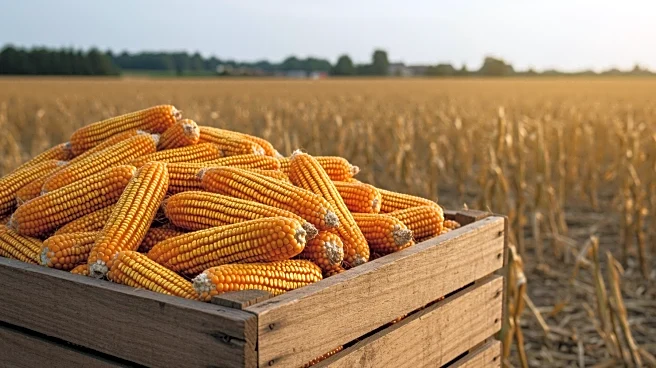What's Happening?
The U.S. Department of Agriculture has projected the largest-ever corn crop for the nation, presenting farmers with the challenge of managing a record-setting amount of residue in fields this fall. This development offers an opportunity to reduce fertilizer costs for the upcoming year. Johnathan Lock, a Meristem Crop Performance dealer, anticipates high yields in Illinois, with some fields potentially producing over 300 bushels. The residue from these high-yielding fields poses challenges but also opportunities, especially given the current high fertilizer prices. Lock emphasizes the value of residue, noting its nutrient content and potential cost savings. He has successfully used Excavator AMS powered by Cyclestrike to break down corn residue and release nutrients for the following soybean crop, improving emergence and reducing costs compared to traditional fertilizers.
Why It's Important?
The record corn crop and subsequent residue management are significant for U.S. agriculture, as they offer a chance to cut costs amid rising fertilizer prices. Efficient residue management can enhance soil health and crop yields, benefiting farmers economically. The use of products like Excavator AMS can reduce dependency on synthetic fertilizers, promoting sustainable farming practices. This shift could lead to long-term benefits for the agricultural sector, including improved profitability and environmental sustainability. As corn yields continue to rise, effective residue management will become increasingly crucial for maintaining soil fertility and optimizing crop production.
What's Next?
Farmers are encouraged to rethink their fertilizer strategies for the 2026 crop year, potentially reducing synthetic fertilizer use if soil test levels are adequate. Meristem's Excavator AMS offers an alternative for residue management, promising better nutrient utilization and cost savings. As corn yields climb, the focus on residue management will intensify, with ongoing research into microbial blends and their synergistic effects on crop yields. Farmers will need to adapt to these changes, balancing residue management with economic considerations to optimize their operations.
Beyond the Headlines
The shift towards biological residue management highlights a broader trend in agriculture towards sustainability and reduced chemical dependency. This approach aligns with global efforts to minimize environmental impact and promote regenerative farming practices. The integration of microbial technologies in agriculture could lead to significant advancements in crop production and soil health, fostering a more resilient agricultural system.










